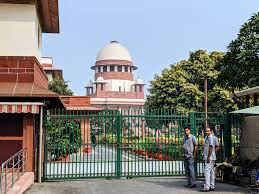The short question which was there before the High Court and which is now before us, is whether the disciplinary proceedings against the respondent (who is admittedly a workman), could be initiated under the CCA Rules 1965 or it could be done only under the Standing Orders certified for the NFC-Hyderabad on 27.08.1973 (hereinafter referred to as “Standing Orders”), under the Industrial Employment (Standing Orders) Act, 1946 (hereinafter referred to as ‘1946 Act’). (Para 2)
The respondent was appointed as a ‘helper’ w.e.f. 05.05.2001 in NFC. Helper is the class IV post and it seems that the eligibility requirement for the post was a Class VI certificate which the respondent had submitted in order to get the appointment. On 23.04.2003 he received a memorandum which said that he had given a false declaration that he had passed Class VI as the transfer certificate of Class VI submitted by him was found to be fake for which a disciplinary action was to be initiated against him under CCA Rules 1965. In response, the respondent denied the allegations and asserted that his certificate is genuine and further contended that the disciplinary proceedings, if any, would be governed by the Standing Orders and not under the CCA Rules 1965, and ultimately, he filed an OA before the CAT, Hyderabad, with a prayer to set aside the proceedings against him, inter alia, on the grounds that the disciplinary proceedings against him can only be initiated under the “Standing Orders”, and not under the CCA Rules. (Para 3)
The case of the respondent is that he being a workman will be covered by the Standing Orders which contain provisions to deal with matters, inter alia, of disciplinary proceedings, and therefore the proceedings initiated against him under the CCA Rules, 1965 are without jurisdiction. (Para 4)
Learned counsel appearing for the Department has drawn our attention to the appointment order dated 05.05.2001, which states that in matters of disciplinary proceedings the employee will be governed by the CCA Rules. The relevant provision mentioned in the appointment order is as under (Para 6)
A standing order is hence no ordinary order. It has a statutory mandate. The 1946 Act mandates all owners of industrial establishments which are employing 100 or more workmen to prepare standing orders which should cover all matters relating to employment of a workman which have been given in the schedule of the 1946 Act and then these standing orders further need to be certified by the authority under the 1946 Act. The objective and purpose of the 1946 Act was to have a certainty in service conditions of workmen and a responsibility was placed upon the employer to formulate fair conditions of industrial employment, including in its disciplinary proceedings against a workman. In other words, standing orders are a set of Rules which have to be strictly followed and cannot be ignored, modified or changed, except in accordance with law. (Para 11)
The CCA Rules, 1965 on the other hand were framed under the proviso to Article 309 of the Constitution of India which are applicable to employees of Central Government. The CCA Rules, 1965 are not specific to workmen as these are general service rules applicable to all employees who work under the Central Government. These are not workman specific Rules, unlike the standing orders. Rule 3 of the CCA Rules, 1965 (Para 12)
There is no doubt that the private respondents come under the definition of workman. Clauses 38 to 44 of the Standing Orders certified for the NCF-Hyderabad in 1973 provided for misconduct, disciplinary action, penalties, procedure, appeal and review. It is, however, true that the Ministry of Labour, Government of India had issued an OM dated 29th July, 1977 where it had clarified that wherever Section 13B of the 1946 Act was applicable for the establishments, the standing orders need not be certified any longer and in case they have already been certified they would become invalid. All the same, the High Court of Andhra Pradesh in its impugned order correctly makes a distinction here which is that whereas for the Madras Atomic Power Project (similarly constituted as NFC-Hyderabad) there is an exclusionary clause in terms of Section 13B of the 1946 Act in its Standing Orders but in the Standing Orders certified for NFC-Hyderabad, there is no mention of Section 13-B of the 1946 Act. (Para 15)
It is also true that in the present case, both the private respondents when they were given employment, their appointment orders clearly said that their service conditions, including disciplinary proceedings, if any, would be governed under the CCA Rules, 1965. Therefore, the case of the employer is that disciplinary proceedings also have to be initiated under the CCA Rules, 1965 and the standing orders will have no applicability in the present case. (Para 16)
Above NFC, Hyderabad has failed to place on record any modification made under Section 10 of the 1946 Act to show that the Standing Orders certified for NFC-Hyderabad would not be applicable to the respondent. Service conditions of respondents will be governed by the ‘Standing Orders’ as far as the disciplinary proceedings are concerned. ‘Standing Orders’ being in the nature of special Rules will override any other general Rule including CCA Rules, 1965. (Para 20)
SUPREME COURT OF INDIA
2023 STPL(Web) 456 SC
[2023 INSC 1033]
Union Of India & Ors. Vs. K. Suri Babu
Civil Appeal No. 1320 of 2010 with Civil Appeal No.1323 of 2010-Decided on 29-11-2023
https://stpllaw.in/wp-content/uploads/2023/12/2023-STPLWeb-456-SC.pdf







